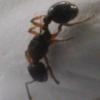So i my two queens:Cataglyphis nodus and Formica rufa first i will start whit Cataglyphis...
I caught my Cataglyphis queen in fourth of july she layed eggs fairly quickly a week after capture the first workers came around a month after but she layed around 7 eggs but only 3 workers hatched the other larva just disappeared maybe half way throw idk what happened to them but i shared this info because i deemed it significant so anyway after the first workers came she did not lay a single egg to this day a month after she is feed well and has a lot of piece so i don't see the reason why she stopped because cataglyphis by the description of a lot of people that keeped them say that the grow rly fast in colony size so this kind of delay in a ant of this sort is rly worrying me.Later i saw to fix the problem myself but failed i put a tea spoon of sand in the test tube because i saw other people do it so i thought it maybe had to do whit her laying ability.
Next is my formica rufa now I'm not rly surprised whit this queen because f.rufa is a very hard sp to keep so i never rly wondered why that much but still there must be a reason to this, the situation is very similar whit this queen exept all of the larva became workers exept for that i don't think further description is needed.Please if some of you know maybe a solution or a method i can try pls share these are my two favorite queens they where very difficult to find so i would be rly upset if this is not solved ![]() .
.
Thank you!

















